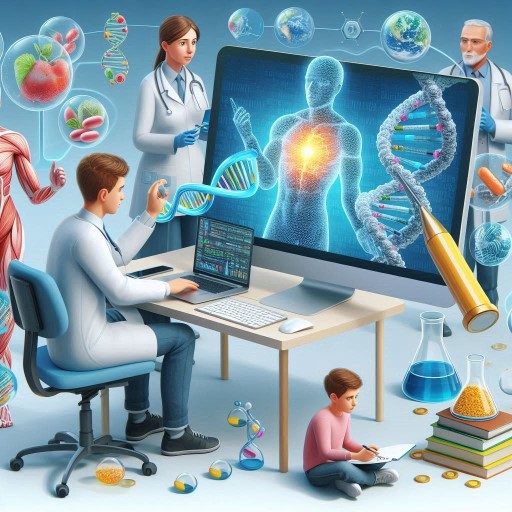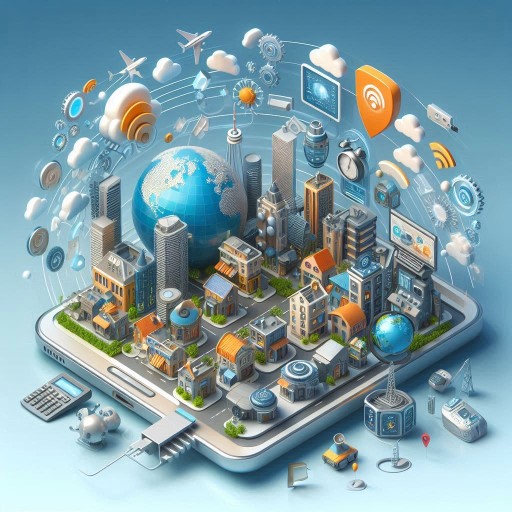TechTrend4u – Biotechnology and genomics are two fields that are undergoing rapid development and have great potential to change the future of human health. With a deeper understanding of DNA and ever-evolving technology, we can now treat diseases in a more precise and personalized way. In this article, we will discuss what biotechnology and genomics are, how they work, as well as some real-world implementation examples that show the significant impact these technologies can have in healthcare.

What is Biotechnology?
Biotechnology is a branch of science that utilizes living organisms or their parts to create products or technologies that benefit humans. In the context of healthcare, biotechnology is used to develop drugs, vaccines, and various other medical therapies. This technology encompasses a wide range of methods, from genetic manipulation to the production of therapeutic proteins.
Read more: Smart Cities: Building the City of the Future
How Biotechnology Works
Biotechnology involves modifying organisms or cells to create specific products. A key technique is genetic engineering, which inserts, deletes, or modifies genes in DNA to achieve desired traits. For instance, scientists produce recombinant insulin for diabetes by inserting the human insulin gene into bacteria, enabling these bacteria to produce large quantities of insulin.
In addition, biotechnology also includes technologies such as gene therapy and gene editing, which allow direct changes to the human genome to treat diseases caused by genetic disorders.
Read more: Artificial Intelligence: The Next Industrial Revolution?
What is Genomics?
Genomics is the study of the genome, which is the entire genetic material in an organism. In healthcare, genomics focuses on understanding how genes and their interactions affect health and disease. With advances in DNA sequencing technology, scientists can now map the human genome more quickly and cheaply, paving the way for precision medicine tailored to an individual’s genetic profile.
How Genomics Works
Genomics involves analyzing genetic data to identify variations and mutations in DNA that may cause disease or affect response to treatment. By studying the genome, scientists can identify biomarkers associated with specific diseases, enabling early detection, prevention and more effective treatment.
One of the major breakthroughs in genomics was the Human Genome Project, which successfully mapped the entire human genome in 2003. Since then, genomics research has progressed rapidly, enabling more detailed genetic analysis and applications in medical practice.
Read more: Big Data Analytics: Making Better Decisions
Real-World Implementation of Biotechnology and Genomics
Biotechnology and genomics have been used in various ways to improve human health. Here are some examples of their implementation:
Gene Therapy and Gene Editing
One of the most prominent applications of biotechnology and genomics is gene therapy, which involves replacing or repairing defective genes to treat genetic diseases. Gene therapy treats inherited immunodeficiency disorders like SCID (Severe Combined Immunodeficiency) by genetically modifying patients’ blood cells to correct immune system defects.
Gene editing with technologies such as CRISPR-Cas9 has also opened up new possibilities in the treatment of genetic diseases. CRISPR allows scientists to cut and replace sections of DNA with great precision, providing the potential to cure previously untreatable diseases.
Precision Medicine
Vaccine Development
Biotechnology has also played an important role in vaccine development. The most recent example is the development of mRNA-based COVID-19 vaccines, such as Pfizer-BioNTech and Moderna. The mRNA technology enables the rapid and effective production of vaccines, which has proven to be crucial in tackling the global pandemic.
An mRNA vaccine works by instructing the body’s cells to produce specific proteins that trigger an immune response. This technology can be easily modified to respond to new variants of the virus, making it an important tool in infectious disease control.
Genetic Testing and Diagnostics
Genomics drives the development of molecular diagnostic tests that quickly and accurately detect diseases. For example, the PCR test for COVID-19 has set a standard in infectious disease diagnostics.
Read more: Internet of Things: Making the World Smarter
Challenges and Future of Biotechnology and Genomics
While biotechnology and genomics offer many benefits, they also face significant challenges:
- Ethics: Genetic manipulation raises profound ethical questions, especially when it comes to gene editing in human embryos and the use of genetic technologies for non-medical purposes, such as human enhancement.
- Cost: Genetic testing and gene-based therapies are often expensive, limiting access for many. As technology advances, it is expected that costs will decrease, making these technologies more affordable to the general public.
- Security and Privacy: The storage and use of genetic data poses significant privacy risks. There are concerns that individuals’ genetic data could be misused for discrimination or commercial interests.
The future of biotechnology and genomics appears highly promising. Ongoing technological advancements will likely bring more breakthroughs in disease treatment and early detection. New therapies will continue to improve human life quality. These innovations offer hope for even greater progress in healthcare.
Read more: Augmented Reality and Virtual Reality: Combining Real & Digital Worlds
Conclusion
Biotechnology and genomics are transforming healthcare by providing innovative solutions for treating, preventing, and detecting diseases. Technologies like gene therapy and precision medicine are revolutionizing how we manage complex health issues. Despite ongoing challenges, rapid advancements in these fields offer hope for tackling previously incurable diseases more effectively and safely. New breakthroughs continue to enhance our capabilities in addressing these medical challenges.



